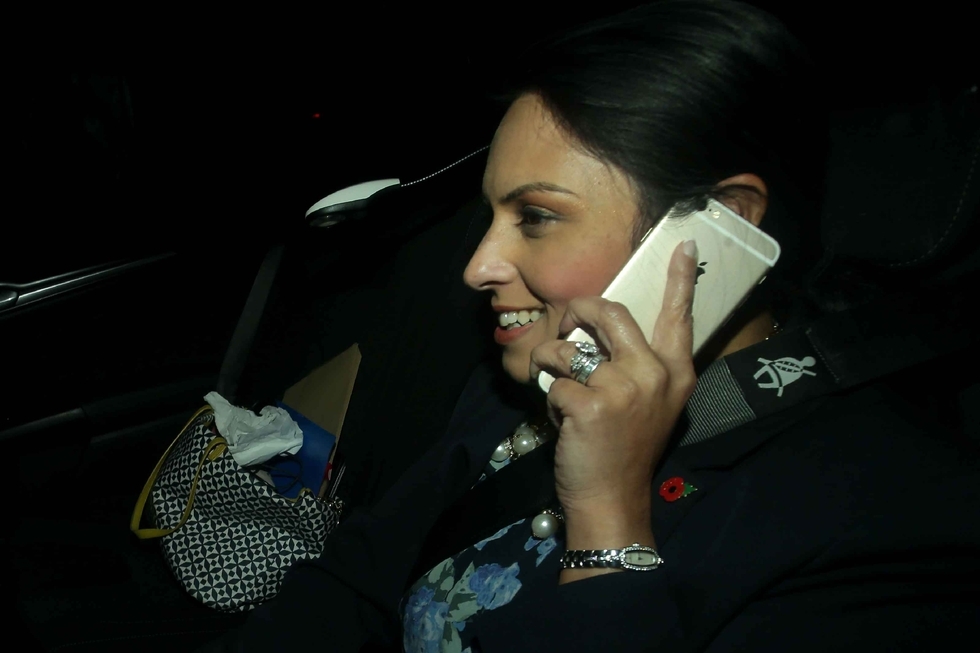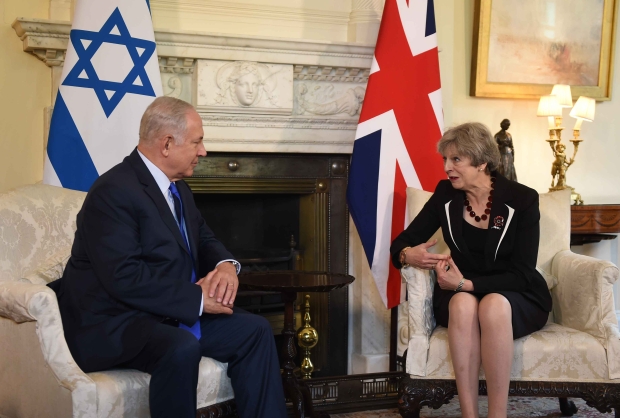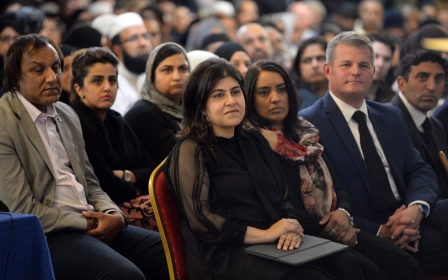Priti Patel scandal: We need a fresh look at British politics and Israel

Months before he became prime minister in 2010, David Cameron warned that the next major scandal to hit British politics would be caused by illicit pressure from big lobbying interests.
Lo and behold, here it is!
The resignation of international development secretary Priti Patel has been framed by commentators as a manifestation of the ongoing political crisis afflicting the Theresa May government.
It is about much more than that. The Patel episode draws attention to one of the most striking features of British politics in the 21st century: the influence of the pro-Israel lobby in Britain.
Israel's improper influence
The agent of Priti Patel's downfall was Stuart Polak, a Westminster fixer who has been the driving force behind the Conservative Friends of Israel for the last 30 years.
Polak told the BBC last week that he and Patel “met up for one or two things. It was the summer holidays. I just joined her for a couple of days, some drinks, some dinner, that kind of thing."
In fact, he seems to have played a much bigger role. It was Polak who arranged and attended the bulk of Priti Patel's meetings with Israeli businessmen and politicians during her so-called holiday in the Middle East in August.
We would all have been in the dark about this but for the diligent and praiseworthy reporting from the BBC diplomatic correspondent James Landale.
Above: Priti Patel also met the Israeli public security minister Gilad Erdan in Westminster in September without government officials being present
This is the second case of its kind in less than a year. Back in January, an Israeli officer called Shai Masot was filmed by Al Jazeera proposing to “take down” Alan Duncan, a Foreign Office minister, who is sympathetic to the Palestinian cause.
Foreign countries have a right to have their voices heard in Whitehall and Westminster. But there are legitimate and well-used channels to enable them to do so
Of course, foreign countries have a right to have their voices heard in Whitehall and Westminster. But there are legitimate and well-used channels to enable them to do so.
Probably no country in the world, barring perhaps the United States and former dominions such as Australia and New Zealand, is heard with such sympathy or finds such legitimate easy access as Israel does in the UK.
So it is particularly troubling that it should also exert improper influence. Patel's undisclosed meetings and Masot's clumsy manoeuvres fall well outside the legitimate bounds of diplomatic business.
The power of the Conservative Friends of Israel
I believe that it is time that a light was shone on this area. This is in part because it is essential that Britain should play the role of honest broker in the Middle East.
Of course, we should regard Israel as a friend, and stand up for its legitimate interests. But the Palestinians need to know that Britain is even-handed.
Eight years ago I presented a film for Channel 4 on the pro-Israel lobby at Westminster. I established that Polak, the then-director of Conservative Friends of Israel, had ready access to David Cameron. I reported how pro-Israel donors to the Conservative Party threatened to withdraw their funding when Tory policy in the Middle East displeased them.
There was a particularly explosive row after William Hague, then foreign secretary, criticised the 2006 Israel attack on Lebanon as "disproportionate". In the wake of this episode, Polak secured a meeting with Cameron in which the Tory leader promised the word "disproportionate" would never be used again.
Cameron's readiness to give in to this kind of pressure contrasted with his predecessor, Conservative Party leader Michael Howard. Howard, I was told, had always been scrupulously careful to keep his distance and maintain formal and proper relations with the Conservative Friends of Israel.
There was an explosive row after William Hague, then foreign secretary, criticised the 2006 Israel attack on Lebanon as 'disproportionate'
The CFI has been an especially powerful presence in the Conservative Party ever since the Cameron years. It can whistle up the foreign secretary or the prime minister to speak at its annual lunches at Westminster, as well as at the Tory Party conference and other events.
For example, current prime minister Theresa May was the guest speaker at last year's CFI lunch at the Plaza Hotel in central London. David Cameron, then still prime minister, gave the main address in 2015.
These annual lunches show the pulling power of Polak's CFI. Typically, they are attended by at least 100 Tory MPs, as well as peers, special advisers and party figures.
There is no question that it has been, for many years, one of the most important lobbying organisations in this country. An article in Haaretz by the well-informed journalist Anshel Pfeffer reveals the kind of influence exercised by the CFI:
"In March 2014, when then-Prime Minister David Cameron visited Israel, Polak and Conservative Party treasurer Andrew Feldman prevailed on Cameron to cut paragraphs criticizing Israel’s settlement policy from the prime minister’s Knesset speech."
Similarly, in an article in the Jerusalem Post in March 1995, historian and former Conservative MP Robert Rhodes James called it " the largest organisation in Western Europe dedicated to the cause of the people of Israel."
It is important to stress that there is nothing inherently wrong with any of this. Indeed, in the interests of transparency I should state that the CFI paid for me to visit Israel 10 years ago.
And I cannot for the life of me imagine what Stuart Polak - a man I know and like - was doing when he took Priti Patel on their private mission around Israel and the Golan Heights during the summer. For this little tour by Lord Polak - he was ennobled by Cameron in October 2015 - appears to have worked only too well.
We now know that Patel came back with a project to divert British aid to support an Israeli army project in the Golan Heights. If she is to have any future career at all, then Patel badly needs to come up with an explanation. So does Polak.
The need for balance
At the start of this year, Crispin Blunt, then chairman of the powerful backbench Foreign Affairs Committee, had the foresight to order an inquiry into British policy in the Middle East. He included in the remit of his investigation "how UK policy is influenced by other states and interests".
It is a great pity then that the first act of Blunt's successor, Tom Tugendhat, was to discontinue this investigation. Otherwise, both Patel and Polak could now be called before parliament to explain themselves. Blunt's proposed investigation could hardly have been more timely in the wake of the Patel and Masot episodes.
Many people believe that British policy towards Israel has been unbalanced for many years. This was all too evident at the dinner between Israeli Prime Minister Benjamin Netanyahu and May on 2 November to celebrate the 100th anniversary of the Balfour Declaration.
In the wake of Patel’s resignation this week, we urgently need a fresh look at British politics towards Israel. Tugendhat must re-open the inquiry he mistakenly closed two months ago.
In the conclusion to my study of the CFI, produced shortly before the Conservatives came to power, I called on the organisation to be "far more open about how it is funded and what it does”.
If Polak and the Conservatives had taken my advice then, they wouldn't be in this pickle now - and hapless Patel would still be in a job
I pointed out that this very secrecy could give rise to false conspiracy theories. The Patel episode demonstrates how right I was.
If Polak and the Conservatives had taken my advice then, they wouldn't be in this pickle now - and hapless Patel would still be in a job.
- Peter Oborne won best commentary/blogging in 2017 and was named freelancer of the year in 2016 at the Online Media Awards for articles he wrote for Middle East Eye. He was also British Press Awards Columnist of the Year 2013. He resigned as chief political columnist of the Daily Telegraph in 2015. His books include The Triumph of the Political Class, The Rise of Political Lying, and Why the West is Wrong about Nuclear Iran.
The views expressed in this article belong to the author and do not necessarily reflect the editorial policy of Middle East Eye.
Photo: Britain's then-International Development Secretary Priti Patel arrives at 10 Downing Street in London on 8 November 2017 (AFP)
New MEE newsletter: Jerusalem Dispatch
Sign up to get the latest insights and analysis on Israel-Palestine, alongside Turkey Unpacked and other MEE newsletters
Middle East Eye delivers independent and unrivalled coverage and analysis of the Middle East, North Africa and beyond. To learn more about republishing this content and the associated fees, please fill out this form. More about MEE can be found here.







